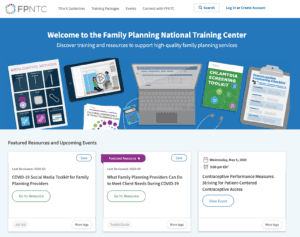Supporting Health Centers through COVID-19: Behavioral Health & Family Planning
April 24th, 2020 | viewpoint
In March 2020, the COVID-19 outbreak across the U.S. was declared a national emergency. Life is changing for everyone; many people are working from home, schools and businesses deemed non-essential are closed, and video calls have become the best (and often only) way to catch up with friends and family. Our work is evolving too. Though our fundamental goal remains the same—to reduce health disparities and support state and federal government and community efforts to extend health care to underserved people—the focus of our training and assistance has shifted to accommodate clients’ needs related to the pandemic.
Over the next few weeks, we will discuss some of the ways our long-standing projects in the U.S. are adapting their work to meet the needs of communities as COVID-19 demands more of our health systems’ resources.
The HRSA Center of Excellence for Behavioral Health Technical Assistance has been working with staff, partner organizations, and health centers to find ways to support and maintain the nation’s health care safety net for our most vulnerable citizens. We have begun compiling a list of resources related to the changing health care landscape, including recommended COVID-19 information for training and technical assistance (TA) on provider mental health, general community anxiety, payment structure changes, guidance on remote counseling, telehealth policy changes, and opioid treatment program guidance for quarantined patients.

In collaboration with the Office of Population Affairs through the Family Planning National Training Center, we developed What Family Planning Providers Can Do to Meet Client Needs During COVID-19 and the accompanying COVID-19 Social Media Toolkit for Family Planning Providers to help family planning providers communicate available services.
Through the New York State Family Planning Training Center, we delivered training on alternative service delivery strategies to 71 staff from New York State-funded family planning clinics. We also developed a New York State-specific fact sheet on providing family planning services during COVID-19. On April 13th, we hosted a webinar on how staff should bill for family planning services provided via telemedicine in New York State.
Even before COVID-19, providers were increasing their focus on telemedicine because of its great potential to improve access to health care. Although previous restrictions related to reimbursement and compliance are being relaxed in response to the crisis, the sudden switch to telemedicine for routine care has required a rapid learning curve for providers, and we are helping them adjust.
We strive to build lasting relationships to produce better health outcomes for all.